- Home
- Michael Chabon
Gentlemen of the Road Page 7
Gentlemen of the Road Read online
Page 7
The ghost in question was, however, no longer among this semi-legendary crew He had come to Amram's tent at dawn with a cold twist of a smile on his lips.
“If I don't ask you to leave with me,” he said, “it's only because I fear you'll turn me down out of sheer perversity.”
“Then, by that logic, you ought to tell me to stay,” Amram said.
“Stay,” Zelikman said. “Fight with strangers. Die on a gate, on a rampart, in a narrow, strange street.”
Amram lay back on the rough ground that had kept him awake all night and looked up at the radiance that had begun to light up the stripes of his tent.
“Maybe I'm tired,” he said. “Maybe I'm tired of picking up life in bits and fistfuls and little drawstring bags. When you get to be as old as I am, there's an appeal in the idea of seeing some business through from start to finish. Besides,” he said, “I don't know why, but I like the kid.”
Zelikman nodded, and then they embraced and spoke some plain words in five languages, all of them roughly synonyms for farewell.
CHAPTER NINE
ON ANXIETIES ARISING FROM THE IMPERMISSIBILITY, HOWEVER UNREASONABLE, OF AN ELEPHANT'S ROUNDING OUT A PRAYER QUORUM
War,” said Jose ph Hi rkanos to the ele phant. He spat on the grass and shook h is head and pulled at the braided strands of his beard. The elephant snorted as if in agreement, with her usual air of stoic disdain, and went on ripping up sheaves of chess grass with her scarified trunk and stuffing them into her mouth. Her own warlike career long past, she was a great placid dam of at least fifty who had been captured by Normans decades ago in a raid on Muslim Sicily and fetched home to Francia to be neglected by a series of improvident barons until the day, six months ago, that she was absorbed, by way of payment, into the far-flung and arbitrary inventories of the Hirkanos clan. “Bad for the Radanites.”
“Not always,” said his nephew, a would-be sharp operator who lacked for the satisfaction of his ambition only the quality of sharpness and who expended all of his energies, as far as Joseph could see, on preserving his opinions from contamination by experience. “War creates opportunities too.”
“In the short term,” Joseph said, and spat again. “Good in the short term is always bad in the long term.”
They stood on a low rise to the west of Atil, above the final bend in the tortuous road that led from the sources of the Danube, across plain and mountain and swamp, by ship and wagon, to the mouth of the Volga, a journey that had required eighteen months of hard travel. Joseph Hirkanos raised to his eyes one of those rare glasses of Persian manufacture that were a special line of his family's trade and scanned the horizon of his woes. A plume of dust half a mile tall moved against the southern sky, slow and menacing, a quill scribing oaths of rebellion along the shores of the Khazar Sea. The reports he had received, discounted by half for lies and bluster and by two-thirds for wishfulness, portrayed the rebels as a tough shank of perhaps five hundred Ar-siyah horsemen seething in a thin broth of Muham-madan irregulars and pimentoed with a fistful of Nestorians, pagans, worshipers of fire and Jews who wished for or foresaw the downfall of Buljan. All of them barbarians, in the view of Joseph Hirkanos, particularly the Khazar Jews. As with most of the Turkic hordes to come tumbling on horseback out of the eastern steppe, outward forms of worship were a matter of relative indifference to the Khazars, and Joseph had always suspected that their adoption of Judaism was not the result of divine calling so much as the mark of a politic reluctance to appear to side with either their country's Christian or its powerful Muslim neighbors.
“Ten years since my last visit, and the exact moment I arrive, a war breaks out,” Joseph Hirkanos said bitterly. If the Khazars, that tolerant and pragmatic people, had fallen prey to doctrinal strife, what hope was there for the world? “A religious war.”
“That is the least of our concerns,” said Menashe, his brother, appearing without a stir of air or a whisper in the grass. Like his brother and any successful Radan-ite Jew, he was addicted to the practice of stealth, silent and modest, fitted by training and nature to pass unremarked among the hostile and warring kingdoms except when the time came to buy or to sell, at which point, like some inverse hero in a legend, he would don his cloak of visibility and bestow the shining gift of trade on nations mired in the darkness of conquest and retaliation. “The Venetian will be dead by sunset.”
They had acquired the stock and services of an Italian merchant Jew in the city of Cherson, where the father of Joseph's nephew showing typically poor judgment, had succumbed to some kind of distemper. Now there would again be nine in their party a situation intolerable to an observant Jew particularly with evening coming on, though Joseph would hardly miss the Venetian's caviling or tendency to whistle tuneless tunes all day and night, even in his sleep.
“That is lamentable,” Joseph said, lowering the Persian glass and looking past his brother, like him hairless and fatless, with the hooded eyes and large ears of some prudent desert mammal, past his half-orphaned halfwit of a nephew, past the huddled mules and horses, past the circle of wagons with their covers of hide and shingled plank, filled with the fortune in furs, hides, lumber, iron and gemstones that he had amassed, bartered and shepherded under so much hardship all the way from Regensburg to this windswept hillock above the lightning fork of the delta, to Atil, a city whose rulers had always displayed a notable passion for the company of elephants. “But even worse, in the eyes of the Most Holy, than the impiety of nine little Jews would be the sealing of yet another trade route from West to East because of squabbling among the faiths.”
“One by one they are being lost,” his brother agreed, his ancestral memory of the decline of the great age of trade fleets and caravans reaching back, like that of all Radanites, to the fall of Rome and the rise of those warring stepchildren of Judaism, the followers of Islam and Christianity, who in violation of God's desire and teaching and above all his good sense would rather kill than haggle.
“That looks like a Frank,” the nephew said, and though his eyes were too young to require the optical arts of Persia and he had been born and raised among Franks, the uncles were so accustomed to ignoring his unbroken string of idiocies that neither paid the slightest attention but continued to gaze down at the shining white city of the Khazars spreading on either side of the river. By the time they turned to acknowledge the straw-haired stranger, mounted on a shaggy horse with a big nose, he was nearly upon them. Joseph just had time to note the band of pallor on the Frank's brow implying the recent loss of a hat, and the giant needle in his sword belt, which perhaps betokened membership in a mendicant order of holy haberdashers or some other monastic absurdity
“You are Radanites,” the lean-shanked stranger said in Frankish, and Joseph thought he detected a note of wonder in the stranger's voice, as if the man knew them not only by their braided beards and the style of their head wraps but had in fact met them before, in person, somewhere among all the roads and kingdoms. “Out of what country?”
“Francia,” the nephew said, before either of his uncles could lay the silencing hand of a vague reply across his fat fool lips. “Regensburg.”
“Ah,” the stranger said, and nothing more, as if the region and the name of the city meant nothing to him, so that Joseph's suspicions were aroused. The stranger swung down from his saddle and stretched his legs, making three slow circuits around the elephant, rubbing at his chin with a persuasive air of expertise, studying the channels and sierras of her hide with his fingertips, marking the graying stubble of her pate, the greater involution and deeper patina of her left tooth in comparison to the right, the skeptical cast of her eyes.
“Cunegunde?” he said finally
“She was known by that name at one time,” Menashe said. “A dozen years ago, when she was part of the menagerie of the Count Palatine of Worms.”
For a moment the stranger abandoned all pretense of wariness and stood marveling at the beast as if, in that remote place between harsh mountains and
a barbarian sea, he had come upon the great gray basilica of Worms itself Something in the stranger's face, his way of scrutinizing the elephant as if seeing through its rough integument to its giant organs and the ducts and sluices that served them, stirred a recollection in Joseph Hirkanos, so that he seemed, for his own part, to recognize the stranger as by a family resemblance, by the anatomist's keenness of his regard.
“Since you have risked a guess about Cunegunde, I will do the same with you,” he said. “Sir, you find yourself among Jews in a piteous estate. The hour of prayer is at hand and we are but ten in number, one sick and dying from some impurity of the blood. And so I dare to inquire, in the hope that the question will not be taken amiss, if perhaps the gentleman might not count himself among the sons of Abraham and Isaac, and so make our tenth?”
The stranger said nothing, gazing up at the pachyderm, who was long overdue for a wallow, her skin dusted with scurf and the residue of travel. He sighed, and the elephant sighed, too.
“Take me to the poor bastard,” the stranger said, “and I will see what I can do.”
They followed the nephew to the tent, striped and bulbous like a Radanite head wrap, in which the Italian lay silvered over with perspiration, eyes open and staring like a fish's. The stranger dropped his saddlebags and called for water to be heated. He knelt and removed his outer tunic and rolled the white sleeves of the inner one. He rubbed astringent oil into his hands and along his forearms to the elbow, to the amusement of the nephew, who drew a wrongheaded moral from the notion of a physician who medicated himself and not his patient. The stranger leaned in to sniff at the Italian's breath, pressed an ear against his chest and took the poor fellow's pulse. While he worked, he asked about the stages of the Italian's illness, and about the stations of the caravan's journey, and how things fared with the Jews of Regensburg, and the condition of the roads, and whether it was true that the kagan of the Khazars might by law be seen by no one but the bek, living in imperial isolation in a palace where he reigned at once absolute and powerless for a strict term until on an appointed day he was taken into a wood and strangled with a silk garrote. The Radanites replied that they had heard the same stories with regard to the kagan, but could add little more to them without falling into the sin of wicked speech.
“I know that's the unbreakable creed of the Radanites,” the stranger observed. “And yet it's a strange paradox that if one lightens a Radanite's wagons while freighting a Radanite's purse, he often finds himself in receipt of the most arrant gossip imaginable.”
Menashe Hirkanos invited the stranger to repeat his question at a later juncture, perhaps after having looked over some of their stock in gems or saddlery, and see if the reply he received then struck him as more informative.
At last the stranger concluded his examination and begged them all to leave him with the patient so that he could enact, in his own dry phrase, horrible and malodorous procedures. When, an hour later, with night having fallen, the stranger joined them for the evening worship, the Hirkanoses, having compared notes in the interval, greeted him with renewed interest, which by their nature they did their best to conceal. After they remembered their dead they sat down by a good fire, and the Sorb slave piled their plates with grilled lamb and rice boiled with onion and fat and filled their cups with wine. The stranger attended to his food without apparent pleasure and sipped his wine. Then he took out a small length of clay pipe or hollowed bone, filled it with a dark paste and lit it with a straw
“Regensburg,” he said. “I spent time there, as a student of physic, many years ago. In the Jewish street.”
“A golden lane of piety and learning,” Joseph Hirkanos suggested, “lighting the gloomy precincts of Christendom.”
“There was a family with whom I lodged. The family of Meshulem ben Hayim, noted physicians all.”
Joseph, Menashe, their Hirkanos cousins and the three other Radanites in the party, members of the Sac-erdoti clan based in Ragusa, maintained the agreed-upon silence, watchful and measured. The nephew snorted and then endeavored to transform the snort into a not very credible simulation of choking on his wine.
“A great family,” Joseph Hirkanos said, in the same bland way “A credit to our brothers in the West. But not one with which we are personally acquainted, alas, having never fallen ill in that city”
“I imagine their numbers have dwindled since then,” the stranger said. “They were never numerous to begin with. A few old bachelors and widowers, buried in their books. Pitiably tending to the bodies of the very nobles and burghers who condone the massacre of Jews by ignorant mobs.”
“I believe,” Joseph Hirkanos said, “that only one of that family remains.”
“Only one.”
“His name-” Joseph pretended to consult his brother with a look “-I believe it may be …”
“Solomon?” the stranger said eagerly, and Joseph understood for the first time how young he was. But he said nothing, and the others shook their heads in solemn ignorance or amnesia.
“You have a remarkable horse,” the nephew said, after a pause. “It's a shame that your saddle and harness are of such poor quality and so hard used.”
The Radanites turned to him and stared, none longer or with more astonishment than his uncle Joseph. The stranger's puzzlement vanished more quickly than that of the Radanites.
“Indeed,” he said. “I owe him better. In the morning I would like to see the best of your stock.”
“Your uncle is dead,” Joseph Hirkanos said. “Your father has abandoned all hope of your return.”
Zelikman ben Solomon smiled.
“He abandoned that years before I ever left Re-gensburg,” he said. “How is the old buzzard's health?”
“Weak. Once we have concluded our business in Atil, we intend to return to Regensburg, taking the more direct route. With God's help you could see him again before it is too late.”
“It was too late for him and me on the day that I was born,” Zelikman said.
“To forgive is a great blessing,” Joseph said. “But it is a greater one still to allow oneself to be forgiven.”
“The Radanite stations are comfortable and well provisioned,” Menashe said. “The consideration you paid in return for passage with us would hardly reflect the luxury you could expect.”
“The old boy doesn't have six months in him,” the nephew said.
Zelikman thought it over, slowly, seeming to visit in his pipe fancy the fog and clear sunshine, the deep fragrant forest, the cathedral bells.
“I accept your kind invitation,” Zelikman said. “My services as a physician ought just to offset my fare.”
The elephant gave a low moan, startling them, and a moment later they heard a faint trill, carried on the wind from off the river, and then another.
“Trumpets,” the nephew said.
They walked to the edge of the upland and saw tiny fires starring the eastern dark. The Brotherhood of the Elephant had at last arrived at the walls of Atil. Zelikman watched the pinpoints flicker with an air of uneasiness as if they formed the points of a constellation by which he hoped to steer a doubtful course.
“War,” Joseph Hirkanos said. “Bad for business.”
Zelikman said nothing for a long while, and the old Radanite assumed that he had not heard or had nothing to add to his sage and bitter remark.
“That's not the case, alas,” Zelikman said finally, “if one is a surgeon.”
The next morning, the Italian sat up and asked for broth and soon afterward was heard to whistle the opening measures of his constant tuneless tune. But when they went to find Zelikman ben Solomon of Re-gensburg, to thank him for saving the life of their companion, of whom, despite his whistling, they were all rather fond, neither he nor his horse could be found. A subsequent inspection of the wagons revealed the absence of a good harness and an excellent Iberian saddle.
CHAPTER TEN
ON THE BELATED REPAYMENT OF THE GIFT OF A PEAR
“I can on ly
s ave men one at a time,” Zelikman said.
He sat cross-legged on a carpe t that smel led like rutting sheep, in the cramped gloom of a circular dog tent constructed, as far as he could tell, from equal quantities of rancid felt, dung smoke and the acrid shadow cast by a naphtha lamp. He was working to get Amram to take him and his proposal seriously, a task impeded by the fact that he was still wearing the robes and head wrap with which the Radanites had generously if unwittingly supplied him, his patchy golden beard tied in trivial plaits and blackened with lamp soot.
“I am not overly encumbered by principle, as you know,” Zelikman continued. “I am a gentleman of the road, an apostate from the faith of my fathers, a renegade, a brigand, a hired blade, a thief, but on this one small principle of economy, damn you, and damn that troublemaking little stripling, and damn every one of those men out there, living men, in full possession, for the most part, of all their limbs and humors, I have to hold firm: if we can only save them one man at a time, then by God we must only kill them one man at a time.”
“I didn't get a word of that,” Filaq said. Having declined to sit with the reunited partners, he leaned against the roof pole nearest the low door flap, hugging himself in the way of a youth trying to keep his temper, glowering at Zelikman from under his ruddy eyebrows. “But if what this barber proposes is that, having mustered these men and promised them redress of their grievance and a fine fight, we now sneak into the city like cutpurses and strangle Buljan in his sleep with a silk girdle … “
“A scarf will do as well,” Zelikman said.
“… and send those good men home with a handclasp and our thanks for their trouble, then I suggest he wriggle on back to whatever reeking Western sump exuded him and leave us to settle this matter in the Khazar way Openly. By fire and steel. And soon, Amram, today, now, before the main body of the army can return from the Crimea and surround us.”

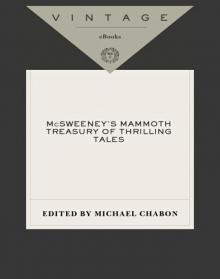 McSweeney's Mammoth Treasury of Thrilling Tales
McSweeney's Mammoth Treasury of Thrilling Tales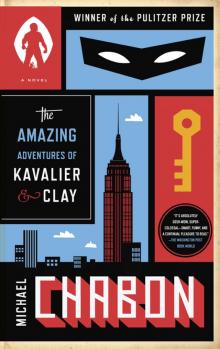 The Amazing Adventures of Kavalier & Clay
The Amazing Adventures of Kavalier & Clay The Yiddish Policemen's Union
The Yiddish Policemen's Union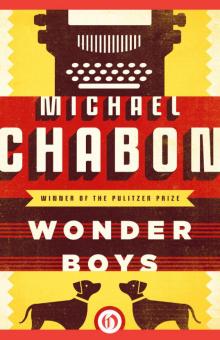 Wonder Boys
Wonder Boys Manhood for Amateurs
Manhood for Amateurs Kingdom of Olives and Ash: Writers Confront the Occupation
Kingdom of Olives and Ash: Writers Confront the Occupation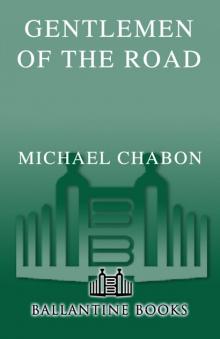 Gentlemen of the Road: A Tale of Adventure
Gentlemen of the Road: A Tale of Adventure A Model World and Other Stories
A Model World and Other Stories Pops: Fatherhood in Pieces
Pops: Fatherhood in Pieces McSweeney's Enchanted Chamber of Astonishing Stories
McSweeney's Enchanted Chamber of Astonishing Stories Summerland
Summerland Telegraph Avenue
Telegraph Avenue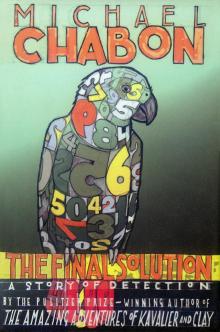 The Final Solution
The Final Solution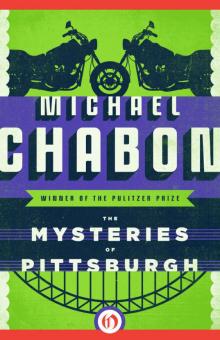 The Mysteries of Pittsburgh
The Mysteries of Pittsburgh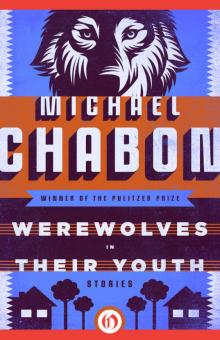 Werewolves in Their Youth
Werewolves in Their Youth Bookends
Bookends Fight of the Century
Fight of the Century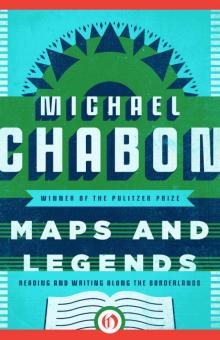 Maps and Legends
Maps and Legends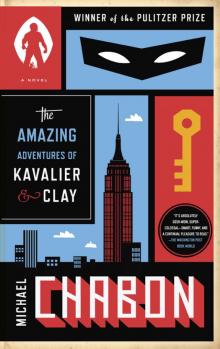 The Amazing Adventures of Kavalier & Clay (with bonus content)
The Amazing Adventures of Kavalier & Clay (with bonus content) Kingdom of Olives and Ash
Kingdom of Olives and Ash Pops
Pops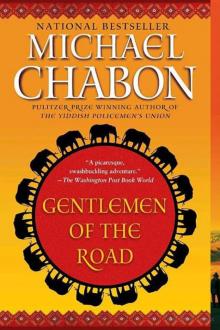 Gentlemen of the Road
Gentlemen of the Road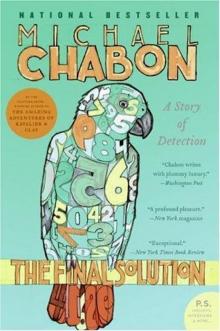 The Final Solution: A Story of Detection
The Final Solution: A Story of Detection Telegraph Avenue: A Novel
Telegraph Avenue: A Novel